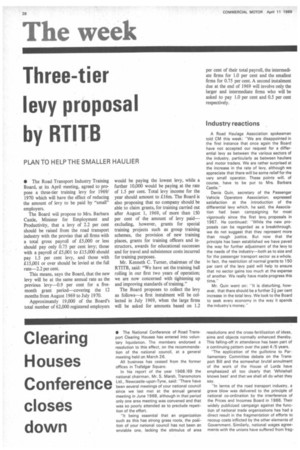Three-tier levy proposal by RTITB
Page 30

If you've noticed an error in this article please click here to report it so we can fix it.
PLAN TO HELP THE SMALLER HAULIER
• The Road Transport Industry Training Board, at its April meeting, agreed to propose a three-tier training levy for 1969/ 1970 which will have the effect of reducing the amount of levy to be paid by "small" employers.
The Board will propose to Mrs. Barbara Castle, Minister for Employment and Productivity, that a levy of 2.2 per cent should be raised from the road transport industry with the proviso that all firms with a total gross payroll of £5,000 or less should pay only 0.75 per cent levy; those with a payroll of £5,001 to £15,000 should pay 1.5 per cent levy, and those with £15,001 or over should be levied at the full rate-2.2 per cent.
This means, says the Board, that the new levy will be at the same annual rate as the previous levy-0.9 per cent for a fivemonth grant period—covering the 12 months from August 1969 to July 1970.
Approximately 19,000 of the Board's total number of 62,000 registered employers would be paying the lowest levy, while a further 10,000 would be paying at the rate of 1.5 per cent. Total levy income for the year should amount to £16m. The Board is also proposing that no company should be able to claim grants, for training carried out after August 1, 1969, of more than 150 per cent of the amount of levy paid— excluding, however, grants for special training projects such as group training schemes, the provision of new training places, grants for training officers and instructors, awards for educational successes and for travel and subsistence costs incurred for training purposes.
Mr. Kenneth C. Turner, chairman of the RTITB, said: "We have set the training ball rolling in our first two years of operation; we are now concerned with tightening up and improving standards of training."
The Board proposes to collect the levy as follows—a first instalment will be collected in July 1969, when the large firms will be asked for amounts based on 1.2 per cent of their total payroll, the intermediate firms for 1.0 per cent and the smallest firms for 0.75 per cent. A second instalment due at the end of 1969 will involve only the larger and intermediate firms who will be asked to pay 1.0 per cent and 0.5 per cent respectively.
Industry reactions A Road Haulage Association spokesman told CM this week: "We are disappointed in the first instance that once again the Board have not accepted our request for a differential levy as between the various sectors of the industry, particularly as between hauliers and motor traders. We are rather surprised at the increase in the rate of levy, although we appreciate that there will be some relief for the very small operator. These points will, of course, have to be put to Mrs. Barbara Castle.
Denis Quin, secretary of the Passenger Vehicle Operators Association, expressed satisfaction at the introduction of the differential levy which, he said, the Association had been campaigning for most vigorously since the first levy proposals in 1967. He continued: "While the new proposals can be regarded as a breakthrough, we do not suggest that they represent more than rough justice. But now that the principle has been established we have paved the way for further adjustment of the levy to the needs of the industry—both as to size and for the passenger transport sector as a whole. In fact, the restriction of normal grants to 150 per cent of the levy paid will help to ensure that no sector gains too much at the expense of another. We really have made progress this time."
Mr. Quin went on: "It is disturbing, however, that there should be a further 2+ per cent increase in the total levy. We look to the Board to seek every economy in the way it spends the industry's money."












































































































































